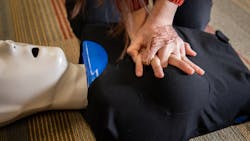Study: Bystanders Fear Giving CPR to Women
Concerns of sexual assault accusations are one of the factors why women are less likely than men to receive CPR from a bystander, according to a new study.
The preliminary findings come from a survey of 520 men and women who were asked to rank potential reasons someone might not want to provide bystander CPR to a woman, based on the sex of the rescuer, according to the American Heart Association. The survey builds on previous findings from the same research team and was presented earlier this month at the AHA's virtual Resuscitation Science Symposium.
In the new study, men and women both responded that the biggest reason men would be reluctant to give CPR to a woman was fear of being accused of sexual assault or inappropriate touching. Conversely, the biggest reason a woman might not help was fear of harming the patient.
The study also noted that a rescuer might not believe women have cardiac arrests or feel that women suffering medical emergencies were simply being overdramatic.
"Hopefully, this information can be used to help us eliminate the biases that people may have," one of the researchers, Shelby Shelton, a professional research assistant at the University of Colorado Department of Emergency Medicine, told the AHA.
According to the AHA, more than 350,000 sudden cardiac arrests happen outside the hospital annually, and of those, 19 percent of adults suffer such an emergency in public. In these cases, CPR from a bystander started immediately can double or triple a person's survival.
But a 2018 study found that only 39 percent of women received CPR from a bystander compared to 45 percent for men. That discrepancy means a man's chance of survival was 23 percent higher than a woman's.
Researchers for the new study found that men and women both had similar ideas what might prevent people from performing CPR in public. Survey participants were asked how they thought others might feel giving a woman CPR, with the question framed in such a way as to "help uncover those hidden fears that people may have" giving a woman CPR, Dr. Ashish Panchal, a professor of emergency medicine at the Ohio State University Wexner Medical Center, who wasn't involved with the survey, told the AHA.
The study's senior investigator, Dr. Sarah Perman, an emergency physician who's also an associate professor of emergency medicine at the University of Colorado School of Medicine, said people need assurance that it's all right to touch a female stranger if it's to help her during an emergency. Panchal said he thinks these findings could be instrumental in training for 9-1-1 dispatchers.
"These are the people who are giving instructions that guide people to perform CPR in real time," he told the AHA. "If they understand the fears people have, they can help to dispel those fears as they are guiding someone on the phone about what they need to do."
